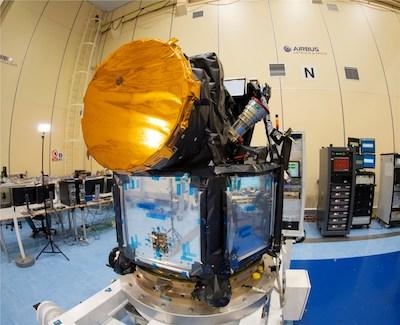Final Technical Review Successfully Passed
Airbus Defense and Space has completed construction of the Cheops satellite (Characterising Exoplanet Satellite). The European Space Agency (ESA) recently gave the green light at the Qualification and Acceptance Review. Representatives from ESA, CDTI (Centro para el Desarrollo Tecnológico Industrial) and Airbus explained the mission, the satellite, and the Spanish participation in the Cheops programme at the media event today at Airbus’ Madrid-Barajas site.

Günther Hasinger, Director of Science at ESA; Javier Ponce, Director General of CDTI; and Rafael Rodrigo, Secretary General of Scientific Policy at the Ministry of Science, spoke at the event. They were welcomed by Fernando Varela, Head of Space Systems of Airbus in Spain.
Günther Hasinger from ESA outlined the importance of this satellite. “We are thrilled to be launching CHEOPS later this year. With its ultra-high precision observations of stars that we already know to host exoplanets, the mission will enable a first-step characterisation of the composition and nature of planets beyond our Solar System," he said. "CHEOPS is ESA’s first satellite dedicated to exoplanets, paving the way to two more missions in the coming decade and consolidating European leadership in exoplanet science.”
According to CDTI, the importance of Cheops goes beyond discovering new exoplanets. It is the first complete ESA mission to be led by Spain. The leadership demonstrated by Spain in Cheops will have positive effects on future space missions. Its launch comes at a key moment for the country as Seville will host the next ESA Ministerial Council at the end of 2019, which will, without doubt help to consolidate this leadership in space missions.
“Airbus has outstanding expertise in science missions in space and for Cheops we are the prime contractor of the first ESA satellite won by Spain in open competition,” said Fernando Varela, Head of Space Systems of Airbus in Spain. “Now that we can see the launch on the horizon we congratulate all the teams involved for their excellent work. This project consolidates the role of Airbus in Spain as the main satellite manufacturer, and reliable prime contractor of the Spanish space industry.”
Cheops is the first of ESA’s small missions, designed to be ready to fly within five years, and using proven technologies, to pave the way for bigger and more ambitious missions. It will perform an ambitious scientific mission focused on defining the properties of planets orbiting nearby stars. The instrument that will study these exoplanets is a Ritchey-Chrétien telescope supplied by the University of Bern, in Switzerland, which is integrated on Airbus’ highly flexible and compact AstroBus-S platform.
The Airbus AstroBus platform has been used successfully on other missions including: Spot 6 and 7, KazEOSat-1, PeruSat-1, Sentinel 5 Precursor and MetOp Second Generation weather satellites.
To build the satellite a group of 24 companies from 11 European countries was selected, seven of these companies are Spanish. The challenges were enormous, especially as the flight model had to be built and tested in only two years.
Airbus will use the time before launch to recheck the spacecraft, upload the latest version of software, carry out simulations for the Launch Early Operation Phase manoeuvres and refine the procedures for In Orbit Commissioning. Airbus involvement goes beyond the LEOP and IOC phases and official delivery of the satellite, by providing support for control of the satellite from the ground and maintenance during the operational phase. The Operations and Support Centre that will coordinate the main ground segment operations will be located at INTA (National Institute of Aerospace Technologies) near Madrid.
The Cheops mission will analyse, for at least three and a half years (design lifetime), the exoplanets’ transit when passing in front of their stars. It will operate in a sun-synchronous orbit. This will provide stable temperatures and constant illumination of its solar panels, minimising the possibility of stray light reflections on the telescope. The satellite is on schedule for launch between October 15 and November 14, 2019, on board a Soyuz launcher from the European Space Port in Kourou.
Cheops is a precursor mission. Data from the spacecraft will be used to generate a list of the most promising exoplanets in terms of being able to sustain life as we know it. Plato and Ariel are the ESA missions that will go deeper in the study of exoplanets beyond the next decade.
(Image provided with Airbus Defense and Space news release)
 ANN's Daily Aero-Term (04.25.24): Airport Rotating Beacon
ANN's Daily Aero-Term (04.25.24): Airport Rotating Beacon ANN's Daily Aero-Linx (04.25.24)
ANN's Daily Aero-Linx (04.25.24) Klyde Morris (04.22.24)
Klyde Morris (04.22.24) Airborne 04.24.24: INTEGRAL E, Elixir USA, M700 RVSM
Airborne 04.24.24: INTEGRAL E, Elixir USA, M700 RVSM Airborne 04.22.24: Rotor X Worsens, Airport Fees 4 FNB?, USMC Drone Pilot
Airborne 04.22.24: Rotor X Worsens, Airport Fees 4 FNB?, USMC Drone Pilot



